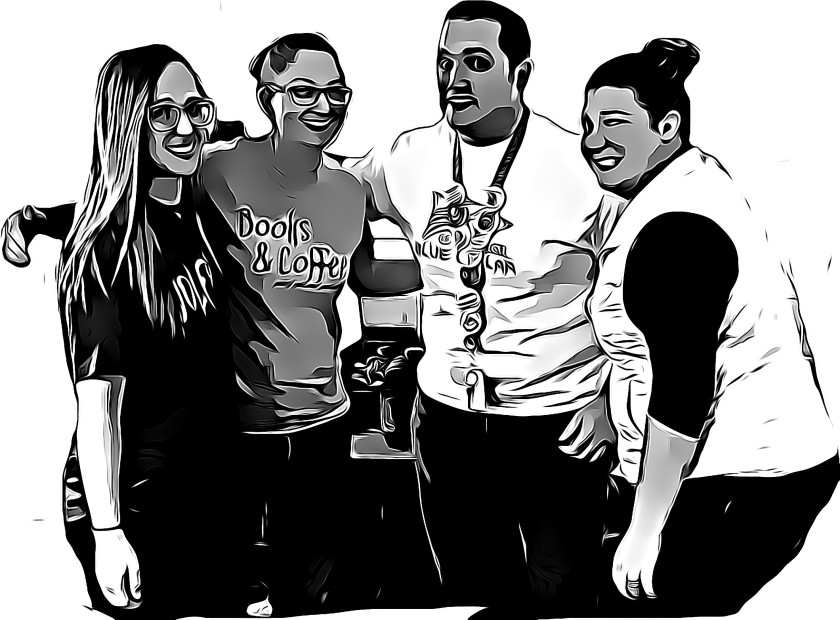Prior to completing my YCE experience, I was informed over-and-over again how rigorous the year would be, how difficult the task overall would be, and how tiring the year would be. Previous YCE students, as well as professors, also mentioned how exhilarating and thrilling the year would be – but I had no idea the impact my students, my CT, or the year itself would have on my life. You see, about two months into the fall semester, I made one of the BIGGEST decisions of my life: I decided to separate from the man I was engaged to, the man I had been with for 6 ½ years, and leave the house I had lived in for years. To top it off, this all occurred two weeks before I began teaching my unit. Cue the sad violin solo, right? Wrong. This was by far the best decision I have ever made for myself. Difficult – Lord knows it was difficult – but the good kind of difficult. It was nice to come into school everyday, engaging with my students, knowing even though I was going through a difficult time, I was making a difference in theirs. Reflecting on this entire year, I realized that so many lessons that I learned throughout the course of my YCE coincided with my break-up.
5 Ways my Break-Up Guided Me Through YCE:
- Adapting on the Fly
- The day I ended my relationship came abruptly. One night, I was lying in bed telling myself “You can do this. At least wait until YCE is over – then consider leaving,” but the next, my car was packed and had become my room for the next few nights. I “couch-surfed” for about a week during fall YCE before I was able to make arrangements to move in with a friend. You would think this type of situation would be oh-so-evident in the classroom – let me tell you, not a single person knew what had happened until I moved into my new place – not even my CT. I had to adapt – I made the decision, I needed to make it work. Just because I was going to a difficult personal time did not mean my students, my schooling, or my future should suffer. Fast forward to second semester, the week we were supposed to begin our Shakespeare unit, reading Titus Andronicus, a text that had not yet arrived, the copier decided to take a break. Act I is LONG. A single scene. Very dense. Yes, I could have read aloud; however, the students needed to be able to follow along the intricacies of the first Act. Even though I attempted the day before, I was forced to wait until the morning of to make the copies I needed. “Don’t worry, the technician will be here this afternoon, it’ll be working in the morning!” Perfect, I’ll just arrive early to prepare for the day. Well, if only the teaching world worked like that. I arrived that morning to a still dead copier. What do I do? I had maybe about 30 minutes before students began arriving… with no copier. They had the background information, but how do I begin reading the play without the play? I then realized along with background information, I had set the stage for discussing the universality of themes found within Shakespeare. Seeing as I taught Twelfth Night the previous semester, I remembered I had an activity that could be paired with She’s the Man – BINGO! I know, I know. I shutter at the thought of showing a movie in class; however, I was able to bring into the discussion, even during Titus Andronicus, the universality and modernization of his works – we were able to research other modern adaptations of Shakespearean plays and the kids had so much fun doing so. I was more entertained at how blown away they were when they made the discoveries themselves. So, what I’m trying to say is sometimes your best lessons (or decisions) come from last minute ideas or plans. Things will not always go in your favor, but things will work out.
- Be the Motivation.
- At the beginning of the semester, I had students fill out an interest survey – I wanted to get to know them. Their likes, dislikes, interests, etc. I had one student who listed music as an interest. In a follow up conversation, I asked him what type of music he was interested in. He mentioned “all types,” but what he was more interested in was “producing music.” I was intrigued and the teacher inside me immediately began creating summatives in which he could express his mastery/knowledge through song. I had a hard time reaching him the first month or so; however, I made my breakthrough during the Shakespeare unit. As a summative choice, students could write a paper, sermon, or song exploring any theme found within the play of their choice. Wandering through the aisles of desks while students began working, the music-producing student asked if I had headphones he could borrow – this was it! He was finally going to create a song for me! As he turned in his final product I was B L O W N away! It was nothing short of amazing. I asked him if I could share it with the rest of the class, and he agreed to it. This student had previously been bullied by some of his peers and struggled with confidence and peer-to-peer interactions; however, when I played his song for the class, I saw a light in him that I hadn’t seen before. Since that day, he walks in each morning smiling and leaves with an even bigger smile. Our students need us to be their motivators – we should motivate them to be the best versions of themselves they can be. But they motivate me even more. Each day, despite what I was going through, they motivated me to get out of bed, get ready, and go into the classroom to mold their minds. I could have easily taken “sick days” to mourn the loss of a relationship, but I didn’t. I am stronger because of them.
- Smile
- Simple enough, right? But when you are in the process of moving all of your belongings out of a house you’ve lived in for the last 3 years with a man you’ve been with for the last 6 ½, it’s hard to remember to smile sometimes. But then again, it’s hard not to smile when the department head is a literal angel-on-earth and greets you as you walk into the building. Or you see the bubbly-blonde from your cohort in the classroom across the hall, smiling encouragingly. Or your CT tells you the most random, off-the-wall anecdote because she thinks it’s that hilarious. But especially when you see your students in your class, looking to you for guidance or diligently working on the assignment at hand. Even on my worst days, just smiling at someone (or someone smiling at me) instantly brightened my mood. Sometimes you just have to grin and bear it – emphasis on the grin.
- Don’t be afraid to ask for help.
- This is a big one. I am a stubborn individual – always have been, always will be. So this was a hard concept for me to learn – and I learned it from a student. Let’s go back to the fall Shakespeare unit – why do most stories revolve around Shakespeare? Any who, I digress. The school I teach at pushes teachers to implement reciprocal teaching and PALS strategies; therefore, I decided to try a re-vamped version of PALS for seniors. From the beginning, students asked to read it aloud – they claimed it helped them understand when I did it for a previous scene. I agree, but only if I get volunteers to read along with me, since there were 9 different parts. Nobody steps up. Okay, PALS it is. As I begin pairing students up, I immediately get pushback from John. “I am NOT working with someone I don’t know. I will NOT read to someone I’m not friends with.” “Well, you’re not reading TO them, John,” I explain,”you are just working together to interpret and make meaning of the scene as partners.” “No, I will not work with someone I don’t know.” The situation escalates, John receives a warning, and proceeds to refuse to work for the remainder of the block. After emailing his mother, informing her of the altercation, some light is shed on the situation – John used to have an IEP, he struggled with reading and comprehension, but he was released his junior year. I had no idea he was not confident in his reading ability (hence the anger and frustration with working with someone he didn’t know) because he was such an amazing writer! If he had only asked for help instead of lashing out, I would’ve known how to assist him better. I now work with him one-on-one to build that confidence up. Seeing him struggle, but address his flaws, showed me that it is okay to not always have everything together. I can ask for help. Instead of creating everything from scratch, I began to ask my CT, and other ELA teachers, for any resources they could spare for lessons I was preparing. I knew going into this career that it is heavily based around collaboration; however, I thought I needed to prove myself this year by myself. But that is not how you succeed – my CT guided me through the year once I opened up to her and began truly requesting advice. She has become my biggest confidant and supporter, thanks to John showing me how to ask for help.
- DO WHAT YOU LOVE.
- This was the biggest lesson learned. I love what I’m doing now. I have loved EVERY. SINGLE. SECOND I have spent in the classroom – good and bad. It wasn’t fair to me that I was made to feel guilty for doing what I loved – which was the ultimate reason I left him in the end. Why should I have to sacrifice doing what I love, making a difference, forming those relationships because he didn’t understand or care? Everyday my students remind me why I chose to do what I did. They bring me joy even in the darkest of times. They make me laugh, smile, and cry in the best ways. I love what I do. By no means did YCE break me up – if anything, it helped me discover who I really am. YCE guided me to a place where I am happier, independent, and on my way to doing what I LOVE, for good. If I had to do it all again from the beginning, I wouldn’t change a single detail.







